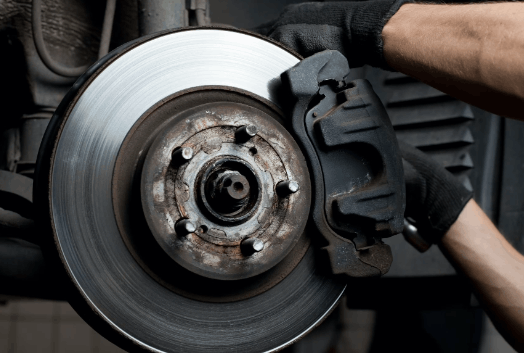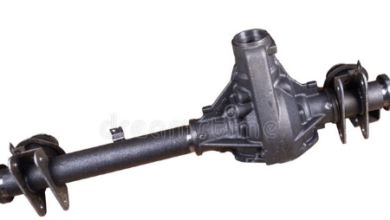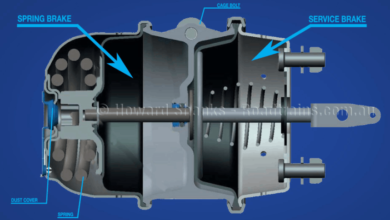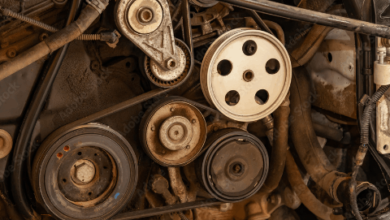Squeaking Noise While Driving but No Brakes Applied
If you are driving your old car or an under-maintained car, you may hear different kinds of sounds coming from the different systems of your car. If you look closely at the technical side, such as the engine system, braking system, etc., you will realize that the structure of a typical car is much more complex. Now, let’s address the problem at hand: a squeaking noise while driving but no brakes applied. What are the general and possible causes of this problem, and what are the general solutions?
Causes of Squeaking Noise While Driving but No Brakes Applied

There can be various reasons for this problem or these noises. Here, we will explain different types of problems, their general sources, and possible solutions.
Unbalanced Calipers
Most noises coming from your wheels or other rotational systems are related to brake parts and brake systems. The calipers of your car’s brake system can be the source of these noises. Calipers are responsible for holding the brake pads, which come in contact with the brake rotors to slow down your vehicle.
When you press the brake pedal, the brake pads come in contact with the rotor through the application of the calipers. The balance between the caliper and rotor is crucial to maintain equilibrium. It should be close enough to apply braking effect but far enough to avoid contact with the brake rotor when the brake pedal is not depressed.
If there is an imbalance between the caliper and the brake rotor, there can be unwanted contacts even when you are not applying the brakes. This contact leads to unusual screeching sounds coming from your wheels, as the brake pads are in contact with the brake rotors.
Solution: This is a challenging issue to solve on your own if you are not familiar with cars. It is best to take your car to a service center or a car mechanic to adjust and achieve the balance between the rotors and the caliper system. This adjustment requires special expertise, and professionals will use specialized tools while lifting or elevating your car.
Problem of Moisture
Moisture on the brake system can also cause squeaking noise when brakes are not applied. This occurs due to moisture-induced contact between the brake pads and the brake rotor, which generally goes unvented.
Solution: There is no exact solution for this problem. You simply need to wait for the moisture to dry over time. Cleaning the moisture from your brake system manually is quite challenging. Alternatively, you can take your car to professional car cleaners who will address the moisture in your brake system effectively. They will ensure proper cleaning of the brakes, and if moisture is the cause, your problem should be resolved.
Please note that these solutions are general guidelines, and it is always recommended to consult a professional mechanic for an accurate diagnosis and appropriate solutions for your specific vehicle.
Old Brake Pads
In general, brake pads are designed to wear out over time, and they need to be replaced with new ones. When brake pads are excessively worn, the bottom material may come into contact with the brake rotor, resulting in squeaking noises even when the brake pedal is not pressed.
Solution: The solution is straightforward. You simply need to replace the old brake pads with new ones. If you have knowledge of car mechanics, it will be relatively easy to replace the old brake pads with new ones. However, aligning the calipers according to the new brake pads can be challenging. We recommend bringing your car to a car service or mechanic to have your brake pads replaced.
Material of the Brake Pad
In the brake market, various types of brake pads are used, made from different materials. Most commonly, brake pads are made from metallic materials, but in some cases, ceramic materials are used. If a ceramic brake pad comes into contact with other materials or surfaces in your brake system, it can create unpleasant noises.
Solution: It is crucial to maintain your ceramic brake pads and clean them regularly. When you take your car to a car service or maintenance, they will take care of this issue as part of regular maintenance.
Sounds Coming from Bearings
Bearings are components that allow shafts to rotate between different mechanical elements. Ball bearings are commonly used in various car mechanisms. Different types of bearings are used in the engine and other subsets of your car. Over time, the small rotational elements called balls can wear out, leading to squeaking sounds.
Solution: As expected, the solution is simple. You need to replace the worn-out bearings with new ones. Replacing different types of bearings requires high expertise, specialized tools, and a high level of mechanical skill that you might not have in your car or garage. If you hear strange noises coming from your bearings, it is advisable to bring your car to a service center. The replacement of worn-out bearings will not cost a significant amount, and regular maintenance at a trusted institution will take care of worn-out parts.
Please note that these solutions and recommendations are provided based on general knowledge, and it is always recommended to consult a professional mechanic for an accurate diagnosis and appropriate solutions for your specific vehicle.
Lubrication Problems
Not only cars and vehicles, but all mechanisms require sufficient lubrication to function properly, preventing heat buildup and premature wear. The moving parts of your car, especially the engine, require adequate lubrication. If there is a lubrication problem, it is common to hear strange noises coming from different elements of your car.
Solution: Take care of the lubrication of bearings, pulleys, and moving parts in your car’s subsystems. If you are not familiar with car mechanics, bring your car for regular maintenance, and the technicians will take care of lubricating the necessary parts. This will help prevent strange noises from the engine or brake system.
Old Rotors
As the name suggests, rotors are the rotating parts that spin with the wheels of your car. The brake pads come into contact with the brake rotors to slow down your car. Over time, you may notice abrasions, wear, and grooves on your rotor. These irregularities can cause unwanted noises coming from the wheels.
Solution: Rotor replacement is not a common procedure for all cars. During regular maintenance, brake pads are generally replaced. However, if your car is old and has high mileage, these issues with the rotor may arise. Replacing the worn-out rotors will solve the problem.
Unwanted Materials on the Brake Systems
The brake system is a complex system with various moving and contacting parts. These parts are exposed to the atmosphere and other environmental factors. Unwanted materials such as stones or debris from the ground, as well as atmospheric contaminants, can get stuck on the brake system, resulting in unwanted sounds.
Solution: The solution is simple. Bring your car to a maintenance or service center and explain the sound issue. They will clean out any foreign materials stuck on your brake system. It is crucial not to exacerbate the problem or disrupt the balance between the caliper and rotor system, as it would be challenging to repair without professional assistance.
Sounds Coming from Suspension Systems
The braking system is not the only one responsible for creating strange noises. Sounds can also originate from the suspension system of your car, even when you are not pressing the brake pedal. Pressing the brake pedal and observing if the sound persists can help identify the source.
Different parts in the suspension system can contribute to the sounds, and it is advisable to bring your car to a mechanic with experience in suspension systems.
Solution: In most cases, the noises come from worn-out dampers in the suspension system. These dampers need to be replaced. This replacement procedure requires lifting the car and removing various components to access the damper system.
Can You Drive with This Sound?
It is challenging to provide a definitive answer to this question, as the sound can have various causes. It is crucial to identify the source of the sound, as it could indicate a potentially serious problem. Driving with a significant issue can cause further damage to your vehicle.
If you are in a rush or have urgent tasks, and you have previous experience with your car creating similar noises, you might be able to drive for a short while. However, it is essential to bring your car to a mechanic or maintenance center to investigate the source of the problem.
How to Examine Squeaking Noise While Driving but No Brakes Applied?
Understanding the real source of the problem can be challenging. While we can provide some tips to help you examine the issue and determine the source, the ultimate solution may require professional assistance. Consider bringing your car to a service center or consulting a knowledgeable mechanic.
- Check the engine oil: Start by checking the engine oil in your car. Engine oil lubricates various parts of the engine that may produce sound. Observe if the noise persists or changes after checking the oil level.
- Check the bearings: Your engine has numerous bearings that hold different shafts and components, such as alternators and camshafts. Listen for the sounds and try to identify which bearing the sound is coming from. That would be the bearing that needs replacement.
- Check the brake system: Inspect the brake system to ensure the brake pads, calipers, and other components are properly aligned and maintained. Determine if the sound is originating from a particular brake system in your car. Visually inspect and assess if there are any issues with the brake systems mentioned earlier.
Conclusion
As described above, there are various causes for squeaking sounds coming from the brake systems or other parts of your car or vehicle. Identifying the exact cause of the sound can be challenging, and we have provided different tips to address these issues. However, it is recommended to bring your car to a maintenance or service center for professional assistance.
We hope this article has been helpful to you. If you have additional questions or require further information about squeaking noises while driving with no brakes applied, please feel free to ask. You can also explore related topics regarding brake systems in cars;
Tail Light vs Brake Light: What Is the Difference?
How Long Does It Take to Change Brakes? Different Cases



